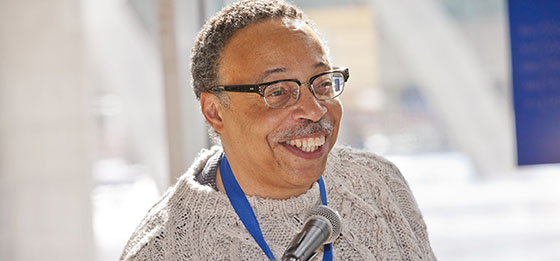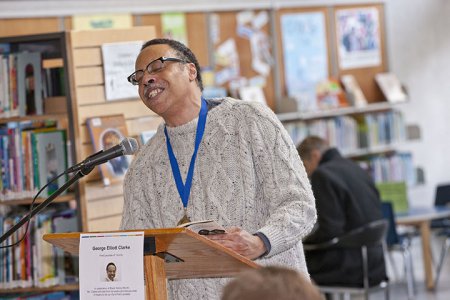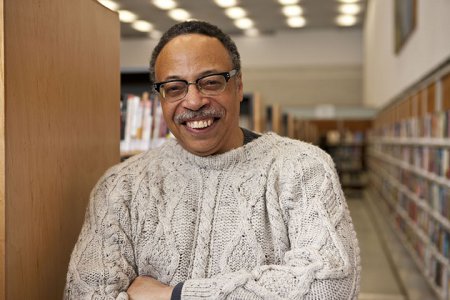
George Elliott Clarke (MA’89, LLD’99): The Word Warrior
By Mark Campbell
The first time George Elliott Clarke (MA‘89, LLD’99) realized the impact that words can have, he was publishing them, not writing them.
Clarke was the editor of the Queen Elizabeth High School newspaper and had run a student article about class bias at the school. “Some students felt they and their parents were being unfairly targeted in that article,” he recalls. “They felt that their relative privilege had been hard earned and should not have been held up for questioning.”
With the blessing of the school principal, those students commandeered the PA system for a rebuttal. “That was an interesting moment. It certainly reinforced this idea that words have power.”
Anyone who has ever encountered Clarke’s work knows how true that statement is. Through his poems, plays and his novel, this University of Toronto English professor has chronicled African-Canadian history and experience with impressive beauty, precision and power. He’s also explored social justice issues that are fundamental in any conversation of what it means to be Canadian. His dynamic voice and fresh perspectives on race, equality and freedom have made him more than a cultural icon; he’s become a popular media commentator. From the Globe & Mail to the CBC, he’s shaped opinions on African-Canadian issues ranging from the importance of Black History Month to whether To Kill a Mockingbird should be banned from classrooms.
The power of Clarke’s work is equally evident in the honours he has earned over the years, including the Order of Canada, the Order of Nova Scotia and the William P. Hubbard award for enhancing race relations. Yet to hear Clarke tell it, one of the greatest honours he’s ever received was the ‘A’ he earned in Tradition and Experimentation in Modern Poetry: 1880-1920 from Dalhousie professor emeritus John Fraser.
“He really reinforced the value of intellectual work, of scholarship, as a means of intervening in social questions,” says Clarke. “He also sharpened the writing of my poetry, and I still send my manuscripts to him for his opinion. I never hesitate to tell anyone who asks that his course was fundamental in deciding my future and ongoing orientation as a writer and a thinker.”
Effecting change
For Clarke, writing has always been about effecting change, though not initially in the way you might expect given his legacy. As a teen of limited musical and athletic ability, he saw it as a way to be more popular with his peers. To a degree, it worked. Friends liked his writing and asked him to craft love notes and poems to impress girls at school. But the class and racial distinctions that Clarke was observing around him – distinctions that were impacting everything from career prospects to his social life – prompted him to take his writing in a new direction.
“I began to read a lot of African-American literature, like the biography of Malcolm X, and I was coming under the influence of people like Burnley ‘Rocky’ Jones (BA’74, LLB’92), Jackie Barkley, and Walter Borden who were very well informed about issues of class, race and social justice.”
There were many other influences on his writing, including Bob Dylan, his grandparents’ rural home, and his family. “My mother was a pioneer in early childhood education. My father was a painter who became a social worker in the late 60s. We had a home that was rich in artistic references – literature, visual art, music. But we also had access to the world through the many influential people who dropped by our house.”
You can find aspects of Clarke’s mentors and inspirations threaded through all of his work, from his epic narrative poem, Whylah Falls, to his novel, George and Rue, to his play, Trudeau: Long March, Shining Path. Although he has, at times, been active in community initiatives – he helped launch and was involved in the Black Youth Organization in Nova Scotia – it is through his writing that Clarke has predominately pushed for change in Canadian culture and society. For him, it’s just as vital as being out there, physically, on the frontlines of any great social or political movement.
 “Scholarship is a necessary tool in order to dislodge deleterious opinion of one community or another, or simply to offer better informed commentary, opinion or analyses of a particular community or situation.”
“Scholarship is a necessary tool in order to dislodge deleterious opinion of one community or another, or simply to offer better informed commentary, opinion or analyses of a particular community or situation.”
It’s also a necessary tool to shine a light on writers who have been traditionally overlooked, such as African-Canadian writers. Clarke has been a pioneer in this regard, although he admits it happened by accident. Asked to write an article on African writers in Canada while teaching at Duke University in 1994, he discovered existing biographies weren’t expressly clear on which writers were black.
“I constructed the first fairly comprehensive, historically enforced bibliography of African-Canadian writers. The ancillary result of that was creating something called African-Canadian literature, because you can’t have the literature without the bibliography. It was an undeniable statement that there was a tradition of black writing in Canada, and I became an African-Canadianist.”
Even so, he wonders if his efforts, and those of his colleagues, have made enough of an impact in raising awareness of African-Canadian writers as part of Canadian literature. “There has been a shift in that direction. I won’t say it is a solid shift. I won’t say it’s a comprehensive change. But there are more courses on African-Canadian literature, there are more anthologies that include Black-Canadian writers and Black-Canadian writers are winning more awards.”
A worthy field
Still, Clarke believes more can be done. This past spring, he hosted the first-ever international conference on African-Canadian literature at Harvard University. He’s also looking at publishing a collection of essays inspired by the conference. “It’s one more way I can help to further establish this as a field worthy of serious academic inquiry.”
Clarke is also working on an epic poem, which he began in 2008, that explores the public image, treatment and debate about people of African heritage in the Western world. Spanning biblical times to the end of the 19th century, it’s a series of dramatic monologues on equality and liberty – some by historical figures, some by characters he’s created. He hopes to have the first volume published in fall 2015. This is in addition to a planned academic exploration of art and literature related to the African diaspora.
“I am a writer first and secondly an academic,” says Clarke. “I know that the effort to be involved in leading social political struggles means that you are not going to have time to do the writing that you want to do or the scholarship you have to do, and is your passion. I have to be prepared to say to others ‘I will support, I will advise, I will write commentary that may be helpful, but I am not likely to be there on the frontlines, unless you want to think about the frontlines as being a library.'”
When you consider how many people Clarke has influenced, and can influence, through his writing, it’s good to know he’s right there, pushing for change, with pen in hand.

